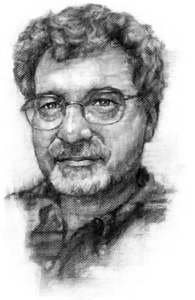Words of wisdom
llustration by Allan Burch

Name: Howard C. Nusbaum
Title: Chair, Department of Psychology; Codirector (with John Cacioppo) of the Defining Wisdom Project, which funds 23 researchers working “to stimulate new distinctive and scholarly contributions to wisdom research and to foster interdisciplinary collaboration and understanding in service of laying the foundation for a field of Wisdom Science”
Degrees: BA (psychology and computer science), Brandeis University, 1976; PhD (cognitive psychology), SUNY Buffalo, 1981
Previous posts: Chair, U of C Committee on Cognition and Communication, 1990–93
What is wisdom? It’s an interesting problem—is wisdom just a judgment society makes about something that has a great outcome, or is it an individual characteristic? [Tufts psychologist Robert] Sternberg has argued that there are certain characteristics of individuals—like values and intelligence—that, when they’re balanced, result in wisdom.
Sternberg’s influence: He’s well known for taking on subjects that are notoriously difficult to parse scientifically, like love, intelligence, creativity. He talked about wisdom and leadership, and I was impressed that, as a scientist, he was able to get some conceptual traction on the problem. And the ways people were thinking about wisdom traditionally—that older people are wise, and you can’t be wise if you’re younger; that wisdom is something that comes from natural experience and not something that can be taught; or that wisdom is a trait and not a situational thing—he convinced me that one should think about wisdom in a different way.
Many ways to be wise: I don’t expect [the project’s researchers] to define wisdom. I’m not even sure that we’ll come up with multiple definitions. I do think we’ll have a better sense of what we would call “in the realm of wisdom” and what we would call “out of the realm of wisdom.” And that moves the thinking one step forward. Aristotle didn’t have one thing that he called wisdom. Given that, we’re in good company.
Answers from ants: One of the grant holders, Berkeley biologist Neil Tsutsui, studies aggressiveness in ants. There was some discussion after his talk about whether there could be an animal model for wisdom. That discussion moved conceptualizations forward in a substantial way. To the extent that wisdom is multifarious—let’s say it brings together smarts, sensitivity to values, social consideration, and the ability to take the long view—ants aren’t going to do that. But if your ability to control yourself in the face of strong motivations counts as a part of wisdom, and we can learn something about that kind of control from ants, then yes, we can learn something from ants.
Socratic (and scientific) methods: If there’s wisdom in this project’s structure, it is the wisdom of constructing an intellectual dialogue that spans disciplines. That facilitates conversations between people who have been thinking about a subject in different ways, and from those conversations emerge new insights.
Institutional intuition: One issue that has emerged from these conversations is, might institutions actually shape behavior in a wise way? In other words, wisdom may not be in the individual; wisdom may be in the structures that constrain the way we behave—appropriate laws or social license to do this versus that social constraint. Maybe those are things that shape wise behavior.
The journey, not the destination: [Twentieth-century German researcher] Paul Baltes was one of the first psychologists to start thinking about wisdom systematically. He didn’t have a test for wisdom, but he did present people with life problems, like a young girl getting pregnant. What should she do? The metric by which he measured wisdom was the complexity with which people thought about the information they needed to answer the question. So it wasn’t the advice, but how you get to a position where you can give advice.
No, you’re the wise guy: To have a good dialogue across disciplines, there needs to be a substantial dose of humility present. If everybody thinks they know how to solve the problem correctly, then there will be a lot of argument rather than productive forward motion. I think we’re seeing that kind of forward motion.
WRITE THE EDITOR
E-MAIL THIS ARTICLE
SHARE THIS ARTICLE
ALSO IN CHICAGO JOURNAL
- Center Stage: Campus events
- Cultural Studies: Brrrring it on, winter
- For the Record: University news
COLLEGE REPORT
RELATED LINK
- Video: Defining Wisdom (University of Chicago News Office, 2009)
